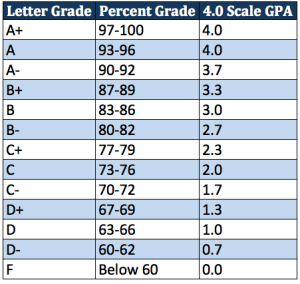
Many students find writing a paper to be a long, miserable experience. They would rather take a five-hour exam than crank out a written assignment. I might be biased, but I don’t think writing an effective paper is that scary.
What makes it a nightmare is when you’ve put it off all week until the last day and you are stuck at your laptop watching the cursor blink at 1 am with three pages left. Talk about unnecessary anxiety.
There is a stressful way to write papers, and a relaxed way that breeds higher grades and confidence. Check out domyessay.
Writing Productivity Tips
1) Don’t procrastinate. A relaxed, prepared mindset gives way to focus, productivity, and better writing. Break your writing into chunks of time; then the process becomes much more manageable and peaceful.
Planning your writing process out in advance gives you the opportunity to come back to the paper with a fresh mind.
2) Start writing at your most productive time. Most professional authors do their writing early in the morning. However, there are exceptions. Entrepreneur Tim Ferriss says he starts writing at 11 pm. It’s up to you.
If you don’t know what time is best, then assume that it’s mornings or early afternoons, because that is when your brain has the most energy.
3) Write at the library or a quiet place where you can sit by yourself. Distracted writing leads to procrastination and bad grades. In my opinion, your dorm is as good of a location as a frat party.
4) Drink coffee or water, eat, and go to the bathroom all before you start writing. The more your body is situated, the easier it is to stay seated and focused and produce more words on the page.
5) A unique strategy for the idea process, on day one, is to get a pen and write down all your thoughts about the topic on a piece of blank paper. Then, circle what thoughts are most useful for your assignment.
I like this productivity tip because it gets you to write without feeling any pressure or fear of failure. And when you’re done, you have tangible ideas to build on for the entire paper. This advice came from a friend of mine, Katie Caprez.
6) Before you stop writing for the day, make sure the last sentence is left unfinished. This helps you get started easily the next time. The reason that it works is your mind will be annoyed that the sentence is incomplete until it’s completed.
Hemingway is famous for this writing tip.
7) Similar to tip #6, after you’ve taken a break and are about to write, it helps to read a couple previous paragraphs or even pages. This gets your mind back on focusing and creating new ideas.
8) Listening to music can help the writing process. Playing soft music in the background will give your brain something to block out, which helps focus on the task at hand. Plus, headphones will protect you from personal distraction and gives the notion that you’re busy to other people who might otherwise interrupt.
9) Visit your professor, a trusted student, or anyone that can possibly help to review your paper. You can ask if you’re on the right track to be polite, but sometimes you will get lucky and they will edit the whole paper.
It’s important to go to office hours or seek help, because there’s nothing worse than spending hours writing, only to later have to do major reconstruction or start over.
10) Don’t write for more than three hours. You’ll be frustrated and do more harm than good after that point.
The 3-Day Plan and 5-Day Plan are basically the exact same. (I copied and pasted parts from the first plan to the second.) Only read the one you need.
3-Day Plan: Average Paper Length
Day 1: Spend 5-15 minutes to think about the topic and some of your main ideas. Consider what you’re going to communicate, and in what order. Then, write out a general idea for the introduction, body paragraph, and conclusion.
During your initial writing, either start these paragraphs, or write out the main idea and what you’re going to do when you start writing in each paragraph. You want to have enough information and structure that you can quickly pick up where you left off for day two.
If you want to include a full topic sentence, main point, support, and transition for each paragraph, then more power to you. It will certainly help you complete the paper, but isn’t necessary.
Day 2: Depending on your personality, start on the paragraph that you think will be the hardest or the easiest. It’s a big momentum changer to finish the hardest part, but sometimes it’s smart to start on the easier part just to get production.
I go back and forth when I write. Your top priority here is to just get started.
Write for two hours and then take a break the rest of the day or night.
Day 3: Write for another two hours and finish what is needed for a complete draft. As you review your work for submission, read it out loud and fix any awkward parts. And remember to add college vocabulary words to replace words that you use too much.
Four hours of prepared, fresh, and focused writing will be enough to ace a medium-sized college paper.
5-Day Plan: Large College Term Paper
Day 1: Spend the day thinking about the topic and your arguments—walking to class, working out, going to bed, whenever. Consider what you’re going to communicate, and in what order. This may seem weird, but it will significantly help you the next day as you start writing.
Day 2: Write an outline with a general idea for the introduction, body paragraph, and conclusion. Either start these paragraphs, or write out the main idea and what you’re going to do when you start writing in each one.
You want to have enough information on the paper that you can quickly pick up where you left off.
Day 3: Depending on your personality, start on the paragraph that you think will be the hardest or the easiest. It’s a big momentum changer to finish the hardest part, but sometimes it’s smart to start on the easier part just to get production.
I go back and forth when I write. Your top priority here is to just get started.
Write for two to three hours and then take a break the rest of the day.
Day 4: Come back fresh and write for another two to three hours to finish what is needed for a complete draft. Review your work, read it out loud and fix any awkward parts.
Day 5: With the last day before the paper is due, it’s important to find feedback. Ask your teacher if they wouldn’t mind looking at what you have so far. Or ask a student you academically respect. Edit your paper based on their feedback. If you can’t find someone to review, then edit your paper yourself. Lastly, before submission, read it out loud and fix any awkward parts.
Additional Insight
To help your motivation and execution, write down the activity for each day in your planner. The same application applies for the 5-day plan. Studies show that writing your goal down improves your motivation.
Although writing a paper and taking a test are clearly different, the strategies in How To Study In College: The Chip Away Strategy and How To Study In College: Focused Preparation are relevant to the paper writing process too. With this blog post and the extra material from those two blog posts, you will have all the information you need to destroy your next paper. Go Godzilla on it. Too far? Well, you get the point.


